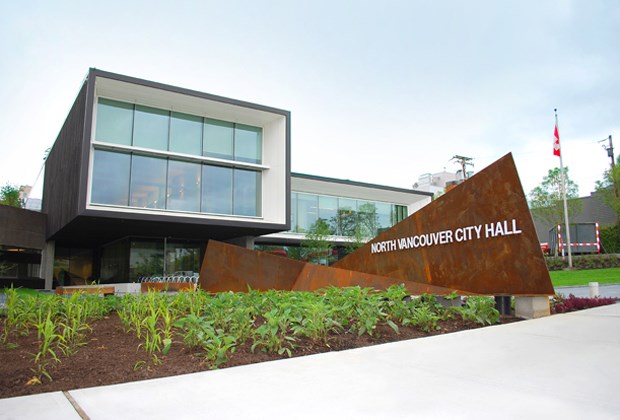The latest bid to amalgamate the two North Vancouvers, or at least study potential amalgamation, came to a halt at a familiar roadblock Monday night - City of North Vancouver council chambers.
And, spiking the debate, the city says the District of North Vancouver isn't paying its full share of North Vancouver's policing bills.
Coun. Guy Heywood had been pushing council to reconsider its long-held position that a potential amalgamation would only benefit district taxpayers. Though he had initially put forward a motion for council to join the district and province in carrying out a restructuring study, council instead passed a motion Monday night directing city staff to review existing shared services and report back on other opportunities to expand cost sharing.
Heywood called the motion a disappointment and questioned how well the shared services between the two municipalities are working now, let alone whether they can be expanded.
"The level of collaboration, I hear, at multiple levels is actually quite low and there is friction across the board in those that we consider shared services. That really happens as a result of the selfish political interests in maintaining autonomy in a jurisdiction that should never have existed in the first place," Heywood said.
A previously unreleased report from city staff confirms there is some basis to Heywood's claim as it relates to the RC MP contract between the two local governments.
The report offers no details on what the disagreement is about but the city's perceived financial hit is clear.
"There is still a significant disagreement on RC MP administration cost sharing; to date, the District of North Vancouver owes the City of North Vancouver over $1.2 million, and the amount is increasing by over $400,000 every year," staff wrote.
A second motion passed by council calls for staff to "resolve the outstanding financial cost-sharing arrangement with the district related to public safety."
Resolving that conflict would likely require a third-party mediator who would be given full access to the RC MP's policing data, according to chief administrative officer Ken Tolstam.
Coun. Pam Bookham also questioned how there can be any more cost saving co-operation when the two governments can't make the policing deal work.
"I would like the district to be invited to provide their perspective on why they have not seen fit to pay what we feel they owe. I would like similar information for firefighting costs, which I understand is the other aspect to public safety that is under dispute," said Coun. Pam Bookham. "I think until they are resolved, the opportunities to find additional cost savings may be limited. I think once we clear these unresolved matters, then it is appropriate that we should be looking at additional cost savings."
In the interest of maintaining intergovernmental relations, Mayor Darrell Mussatto suggested the discussions over the policing bill should be held behind closed doors.
Heywood said he would support any attempts by North Shore residents to amalgamate the two North Vancouvers, or to simply pursue more shared services.
Following Monday's meeting, district CAO Dave Stuart confirmed the dispute is over the formula used to determine what portion of policing and administrative costs each municipality should pay. The two governments agreed four years ago to review and update the arrangement for the civilian staff, but deferred making any decision. Now the district says it's time to review the formula for paying officers as well.
"We felt that more resources were being dedicated to the city than the district and therefore we thought the formula for police should be changed," Stuart said.
Of the roughly 130 officers on the job, the district pays for 76 compared to the city's 54. Yet calls for service and criminal code investigations are split 51/49 in the district and city.
"It just shows you that the actual resources being consumed by either criminal code investigations or general duty calls for service are almost even but certainly the funding formulas are not," Stuart said.
If the formula were based on calls for service alone, it would shift about $2 million per year off the district's books and onto the city's, though Stuart said it's more likely they would use a hybrid approach factoring in criminal code cases, population as well as calls for service, which would result in a $700,000 annual bump to city tax bills.
The policing agreement is just one shared service agreement between the two municipal halls that is decades old and in need of review and revision to reflect modern reality, Stuart said.



